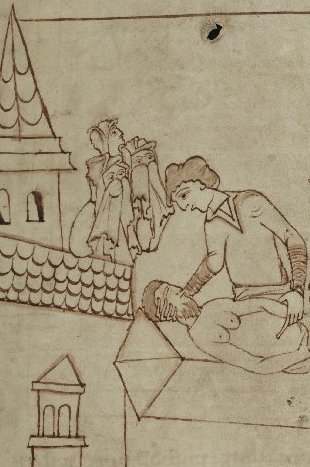
Old English Wife’s Lament
Ic þis giedd wrece bi me ful geomorre,
minre sylfre sið. Ic þæt secgan mæg,
hwæt ic yrmþa gebad, siþþan ic up aweox,
niwes oþþe ealdes, no ma þonne nu.
A ic wite wonn minra wræcsiþa.
Ærest min hlaford gewat heonan of leodum
ofer yþa gelac; hæfde ic uhtceare
hwær min leodfruma londes wære.
Ða ic me feran gewat folgað secan,
wineleas wræcca, for minre weaþearfe.
Ongunnon þæt þæs monnes magas hycgan
þurh dyrne geþoht, þæt hy todælden unc,
þæt wit gewidost in woruldrice
lifdon laðlicost, ond mec longade.
Het mec hlaford min herheard niman,
ahte ic leofra lyt on þissum londstede,
holdra freonda. Forþon is min hyge geomor.
Ða ic me ful gemæcne monnan funde,
heardsæligne, hygegeomorne,
mod miþendne, morþor hycgendne.
Bliþe gebæro ful oft wit beotedan
þæt unc ne gedælde nemne deað ana
owiht elles; eft is þæt onhworfen,
is nu swa hit næfre wære
freondscipe uncer. Sceal ic feor ge neah
mines felaleofan fæhðu dreogan.
Heht mec mon wunian on wuda bearwe,
under actreo in þam eorðscræfe.
Eald is þes eorðsele, eal ic eom oflongad,
sindon dena dimme, duna uphea,
bitre burgtunas, brerum beweaxne,
wic wynna leas. Ful oft mec her wraþe begeat
fromsiþ frean. Frynd sind on eorþan,
leofe lifgende, leger weardiað,
þonne ic on uhtan ana gonge
under actreo geond þas eorðscrafu.
Þær ic sittan mot sumorlangne dæg,
þær ic wepan mæg mine wræcsiþas,
earfoþa fela; forþon ic æfre ne mæg
þære modceare minre gerestan,
ne ealles þæs longaþes þe mec on þissum life begeat.
A scyle geong mon wesan geomormod,
heard heortan geþoht, swylce habban sceal
bliþe gebæro, eac þon breostceare,
sinsorgna gedreag. Sy æt him sylfum gelong
eal his worulde wyn, sy ful wide fah
feorres folclondes, þæt min freond siteð
under stanhliþe storme behrimed,
wine werigmod, wætre beflowen
on dreorsele. Dreogeð se min wine
micle modceare; he gemon to oft
wynlicran wic. Wa bið þam þe sceal
of langoþe leofes abidan.
“Wife’s Lament” from the Exeter Book (Exeter Cathedral Library MS 3501), from edition by Bernard Muir, The Exeter Anthology of Old English Poetry, Volume I, Exeter: University of Exeter Press, 2000: 328-330.
“The Wife’s Lament:” A Modern English translation by Leanne MacDonald
Translator’s preface
I sadly sing this song of mine,
Of my journey of misery.
I tell the tale as I grow old
True now as will ever be.
My exile-journey is full of woe
Since my lord went out to the deep,
My dawn-cares have been full of him
And all I have done is weep.
A friendless wretch, I went to seek
A household of my own;
But that man’s kin had secret thoughts,
To make us each alone.
They willed us to live hatefully
Spread far across the land,
And while I yearned to be with him,
They did as they had planned.
My lord ordered them to cloister me,
Where I had no faithful friend,
My lonely thoughts consumed my heart,
And made my soul descend.
I found my perfect man was sad,
And thinking of a crime,
In joy we said we’d part at death,
But that was a different time.
Near and far I must take heed
Of my dear one’s enmity,
He made me live in an earthen cave
Beneath a great oak tree.
This old earth-hall has saddened me,
Its aura dark and dim:
Dull valleys, hills and brambles
Increase my want of him.
My lord’s departure seizes me,
When I think on it each day;
I know out there are lovers,
But it is here that I must stay.
Where I must sit the summer-long day,
Where I lament my ban;
I may not rest my thoughts and cares
From longing for that man.
If anyone shares my sad lot
May he harden his heart and mind,
He needs a glad demeanor,
His breast-care for to bind.
If he takes joy in his worldly self
When he is wrenched from his native plot,
Then he will sit in sorrow,
He’ll ever be distraught.
His roof will be a stormy slope
All full of frosted stone
In dreary hall mid waters,
That man will stand alone.
He’ll be thinking of the Joyous House
Much sorrow will he bear,
All woeful is the lover,
Who abides his Love with care!
Recitations by Leanne MacDonald…
In Old English…
… and in Modern English translation
Leanne MacDonald
PhD Candidate
University of Notre Dame
